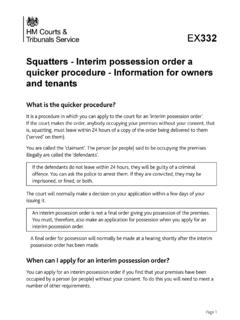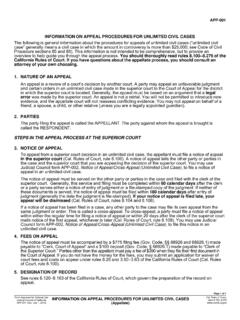Transcription of EX340 - I want to appeal - what should I do?
1 Page 1EX340 About this leafletThis leaflet will help you if you want to appeal against the decision. It will tell you: what to consider before you appeal ; what you need to make an appeal ; and what to expect from the appeals can find more information about making an appeal in the guidance notes that come with the appellant s notice forms N161, N161A, N164, FP161 or can get a copy of the forms and notes for guidance (including for the Court of appeal ) at we use in this leafletThe court in which your case was decided is referred to as the lower court .The court to which you are appealing is known as the appeal court .If you are the person who wants to appeal , you are the appellant , and the other party (person) is known as the respondent.
2 Important information about this leaflet. This leaflet is only a guide. You may want to get independent legal advice before making decisions based on this you need this leaflet in an alternative format, for example in large print, please contact your local want to appeal - what should I do?For people who want to appeal against a court decision in civil and family appealsEX340 I want to appeal - what should I do? ( ) Crown copyright 2016 Page 2 Can I appeal against the outcome of my case?You cannot appeal against the lower court s decision just because you think the judge got it wrong . You can only appeal if you have proper legal grounds for example, if you can show that the decision was wrong because of a serious mistake or because the procedure was not followed you are in any doubt about your grounds for appeal , you should get advice from a legal representative, law centre or advice should I think about before I make an appeal ?
3 Appealing can be a costly and lengthy process. These are some of the things you need to consider before you may need permission to appealIn most cases, you will have to ask a judge s permission to appeal (unless you were already granted permission at your hearing). The judge will only grant this permission if they think the appeal has a real chance of succeeding or in family proceedings, there is some other valid reason for your appeal to be need to act quicklyOnce the court has made its decision, you have a limited time in which to must file your appellant s notice: within the time limit set by the judge whose order you are appealing against; in family proceedings where that judge has set no time limit but the appeal is against a case management decision or an interim care order under Section 38 (1) of the Children Act 1989, within seven days after the date of the decision you want to appeal against was made.
4 And if the judge sets no time limit, within 21 days of the decision you want to appeal may need legal adviceCourt staff cannot give legal advice, for example whether you should appeal or whether your appeal will be successful. The success of your appeal is likely to depend on detailed legal and procedural points, so we strongly advise you to get advice from a legal can also get free legal information and advice from a law centre or Citizens Advice at 3 You may have to pay a feeYou will usually have to pay a court fee when you appeal . You will find a list of court fees in the leaflet EX50 - Civil and Family Court fees available online from may not have to pay a fee, or the fee may reduced, if you only have a small amount of savings and investments, receive certain benefits or are on a low income.
5 This is sometimes known as fee remission. You can apply for help with court and tribunal fees online at or through the EX160 Apply for help with fees form and EX160A How to apply for help with fees may be awarded against youIf you lose your appeal , you may be told to pay the other person s costs, including the costs of their legal representative, if they have I need permission to appeal ?You will not need permission to appeal against a decision of a lay magistrate in the Family Court. You will need to ask for permission to appeal if: you did not ask for permission during your hearing; or you did ask for permission but your request was refused. In both cases you must get permission from the appeal may also have to get permission from the appeal court if yours was a small claims case, and the decision was made in your absence because you did not go to the a small claims case if you do not attend and you have not given the court notice that you are not attending, the party can apply to set aside judgment and not appeal .
6 If you have given the court notice that you are not attending and you do not agree with the decision, it is an , the judge will only grant permission to appeal if they think the appeal has a real chance of succeeding or, in family proceedings, there is some other valid reason for your appeal to be 4 how do I apply for permission to appeal ?If you have not got permission to appeal from the lower court, you must make your application for permission to appeal in the appellant s notice. You can make the application for permission to appeal and the appeal together, using the same appellant s notice will be either the N161, N164 or FP161 and will depend on the type of proceedings and which court you are making the appeal form comes with detailed guidance notes, which you should read carefully before you begin.
7 The notes tell you how to fill in the form and what documents you must provide with your can get a copy of the forms and notes for guidance at do I issue an appeal ?If you have permission and are ready to issue your appeal , you must fill in the appellant s notice (except the sections on permission) and send it with the appropriate fee to the appeal court. This is known as filing an appeal .You must include enough copies of the notice and the supporting documents as indicated in the guidance , you cannot introduce new evidence in your application without the appeal court s permission. New evidence is evidence that was not used at your hearing, or which has become available since must I file my appeal ?The date by which you must file your appeal will usually be given on the order you received giving you permission to appeal .
8 If no date is set, you must file your appellant s notice within 21 days of the date when the decision in your case was , if you file an appellant s notice that you haven t filled in fully and you need to alter it after it has been filed, you will need to apply to the appeal court to do 5 Which court should I appeal to?This depends on the court and the level of the judge who made the decision in your case and the type of order they made, as outlined cases The general rule is that an appeal will be heard by the next level of judge, for example an appeal against a decision of a district judge in the County Court will be heard by the circuit judge in the County Court, and an appeal against a decision of a judge of the High Court will be dealt with by the Court of appeal (see table below).
9 The table below sets out the details for civil cases. Civil cases, other than insolvency proceedingsCourtDeciding judgeDecision under appeal Heard byCounty Court District judgeAny, other than a decision in non-insolvency proceedings brought under the Companies ActsCircuit judge in the County CourtA decision in non-insolvency proceedings brought under the Companies ActsHigh CourtCircuit judgeAny decisionHigh CourtHigh CourtMasterAny decisionHigh Court High Court judgeAny decisionCourt of AppealIntellectual Property Enterprise Court (IPEC)District judgeAny decisionEnterprise judge in the IPECE nterprise judgeAny decisionCourt of AppealPage 6 Civil cases, insolvency proceedingsCourtDeciding judgeProceedingsHeard byCounty CourtDistrict judgeIndividual insolvencyHigh Court judge Corporate insolvencyHigh Court judge or registrarCircuit judgeAny decisionHigh Court judgeHigh CourtMaster, registrar or district judge Any decisionHigh Court judgeHigh Court judgeAny decisionCourt of appeal Family cases proceedings in the Principal Registry of the Family Division, including proceedings under the Inheritance (Provision for Family and Dependants)
10 Act 1975 and proceedings under the Trusts of Land and Appointment of Trustees Act judgeDecision under appealHeard byDistrict judge Any decisionHigh Court judge (Family Division) High Court judge (Family Division)Any decision Court of AppealThe table below sets out the details for where family appeals should be lodged. Judge who made the decision to be appealedAppeal toOne or more lay justices sitting in the family court Circuit judge sitting in the family courtA judge of district judge level sitting in the family courtCircuit judge sitting in the family courtA district judge or senior district judge of the Family Division sitting in the family court in financial proceedings Judge of High Court judge level sitting in the family court A circuit judge or recorder sitting in the family court, except where the example below appliesA High Court judge sitting in the High Court Page 7A circuit judge or recorder sitting in the family court where the appeal is from:(a) a decision or order in proceedings under.












